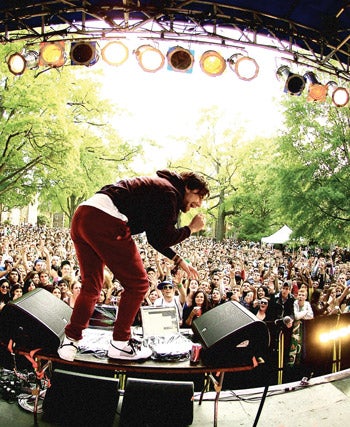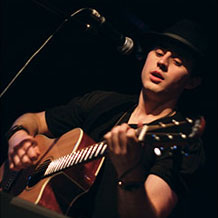dialogue
Mashup Master
Gregg Gillis discusses the engineering, ingenuity and energy required to be Girl Talk.

Gregg Gillis bought his first laptop before arriving at Case Western Reserve. That computer not only helped him write papers and solve complex equations, but also allowed him to launch his musical career as the solo artist Girl Talk—right from his residence hall room.
These days, his laptop is a souped-up version he covers in Saran Wrap during shows to protect from sweat and spills. On it, he blends and mixes existing music— from Britney Spears to Nirvana, Journey to Public Enemy—to create entirely new songs. On his 2010 album, All Day, he used more than 370 snippets of songs on the 71-minute album; the use of samples, he has said, is covered by copyright law’s fair use principle.
The creative “mashups” by Girl Talk (so named because Gillis wanted to throw off others in his industry by having the name of a “10-year-old girl’s” band) have earned rave reviews from The New York Times, NPR and Time, not to mention the tens of thousands of fans who fill his high- energy performances, from Cleveland’s own Grog Shop to major music festivals, such as Coachella in California and Pitchfork in Chicago.
Gillis, 31, a Pittsburgh native and resident whose sixth album is set for release later this year, talks with think about his evolution from biomedical engineer to international music innovator.
Q How did your musical tastes—and talents— change while at Case Western reserve?
A Gregg: During high school, I did a lot of experimental, difficult-to-listen-to music. But when I started doing Girl Talk at Case Western [Reserve], I really grew comfortable trying to make something more accessible, something a little closer to pop. In college ... that experience of showing up at parties and seeing people actually physically responding to music—I wanted that to be part of what I was doing. Those four years were just so extremely pivotal as far as solidifying an aesthetic and having a new outlook on what I wanted to do with music.
Q You graduated with a degree in biomedical engineering and spent some time working as an engineer.
A Gregg: After graduation, I toured around doing music for a [few months], but pretty much right when I had to start paying those student loans off is when I buckled down and tried to get a job.I got a job as an engineer in November 2004, then quit in June 2007. The job I got after school [at a Pittsburgh company focused on sleep research] was great—it was better than I would have anticipated. I liked the people working there; I liked the stuff I was working on. ... I was comfortable doing both simultaneously.
Q So when you left your engineering job, it had just become too much to do both?
A Gregg: Pretty much. I loved doing music and would do it as much as possible, so on the weekends, I’d go out and play shows. But it was never like I was trying to “make it”—it’s just what I enjoyed doing.
In summer of 2006, I put out my third album [Night Ripper], and that album caught a buzz that others didn’t. All of a sudden, websites were reviewing it, magazines were covering it and it really started to snowball. By the end of that year, I had a booking agent for the first time—and I had a day job. Every weekend I was flying out Friday, doing a show, coming back Sunday and going to work on Monday. It was like that for a while, and it just kept growing. Finally, it got to the point where ... I was getting offers to go to Australia or Europe and I had already used up my vacation days for 2007 by February. (Editor’s note: Gillis’ coworkers didn’t know he was performing around the country and world at the time.)
I honestly held on to both as long as I could because I couldn’t wrap my head around the fact that this music thing could become a profession. It was something I’d done since I was 14, but I’d never thought about it like that. ... When I did quit the job, I thought it would be cool if I could maintain living off music for one year. That would be a dream. It would be a great vacation and really fun, and then I could go back and try to apply to a different job and get that going again. That was honestly where my mind was.
That was six years ago. It’s just kept rolling.
Q How does your engineering background help your musical skills?
A Since it’s combining different elements together to try to find something interesting, it’s very trial and error. That by itself is kind of a scientific process. It’s similar to my engineering job: I work on small bits and pieces that will go on to impact a much larger picture.
Q Your shows are known for being high energy—and a little crazy. it seems like an interesting juxtaposition for an engineer. How did this on-stage act come about?
A When I started, I was a fan of electronic music and of going out to see people perform on laptops, but I thought a lot of the shows were boring. You paid money to go see someone sitting there staring at a computer, and it looked like he was checking email for an hour. I really wasn’t into that.
Given the fact that I was sampling pop music, I wanted to embrace pop culture in every aspect—from the music to the artwork to the performance. I thought it would be fun to put on a performance that would be like an arena rock show. Even my first shows were focused on that, when I was playing to 15 people in a basement and having homemade pyrotechnics, outfit changes. People really weren’t doing that with laptop performances, and I liked that. I liked standing out like a sore thumb.
It’s fun to be able to get up on stage and act like a crazy person, and then go back to real life afterward.
To learn more about Gillis, download his music or find tour dates, visit illegal-art.net/girltalk.
